7 games for frequent readers

The range of media to consume these days is very broad. From what I’ve seen among book people, books are in first place, of course—but films, series, and games are often big topics too. As a software-developer nerd, it’s only natural that I’m not averse to a bit of refined gaming, and on many an evening a smooth, well-made game beats any reading session. While radio, TV, and film no longer play a role for me, well-crafted games are a welcome way to spend time.
If “games” makes you think of greasy casual smartphone titles, war shooters, or the notion that it’s all just mindless consumption for teenagers, I’d like to offer a different impression here. There are brilliant games that, to me, are works of art—whose stories can hold their own with books, whose music belongs in the premium league, and that whisked me away to completely different worlds and left me deeply impressed. What does that have to do with books and a book blog? I’ll explain in this post and introduce a few excellent books that show how much love of detail and craftsmanship goes into such games.
What distinguishes the games presented here—besides the fact that I, as an avowed heavy reader, like them? What makes them interesting specifically for bookish people? I admit the selection is highly subjective—how could it be otherwise. But for me they fulfill criteria that also apply to books. The world has to be coherent; there must be a story that captivates but doesn’t constrain too much; it should convey a mood and draw me into a distinct, powerful narrative. The same standards I apply to a novel, really. Visually, there has to be something on offer too—though lovingly crafted illustrations or a truly individual style can outshine any elaborate engine.
The games presented here are also friendly to a slim budget. None of them are brand-new; if you look around a bit, you’ll find them quite cheaply on eBay or platforms like gog.com or Steam.

Of course we have to start with Monkey Island. The first part appeared in 1991, fit on a handful of floppy disks, and is still very well known. I’m always surprised how many people played it back then and still remember it fondly. The original graphics are, naturally, no longer up to date, and because there are so many fans, the first two parts were remastered and redrawn. You can get the games for PC and also for iOS—which makes for a very pleasant experience, lounging on the sofa with a tablet.
Monkey Island is a classic pirate story with everything that entails. You slip into the role of Guybrush Threepwood, who wants to become a pirate and must pass several trials to do so. Along the way he falls in love with Elaine and crosses swords with the ghost pirate LeChuck. The game never skimps on humor, and as an adventure there are puzzles to solve—sometimes very quirky ones. Think “insult swordfighting,” or a spitting contest.
Ron Gilbert, the game’s creator, crafted a very entertaining and funny story with numerous running gags. You can’t really take the whole thing too seriously. He was inspired by Tim Powers’s novel On Stranger Tides (German title: In fremderen Gezeiten)—a book that delivers everything a good pirate tale needs: buccaneering, beachside carousing in Nassau, voodoo, ghost pirates, and of course a light touch of romance. If you like pirate stories, I can only recommend the read. The developer commentary is fantastic, as is the option to switch at any time between the original 1991 graphics and the new drawings—perfect for retro gamers.
If you keep an eye out, you can get the first two parts at a bargain price on gog.com. They run good sales regularly. And in the Apple App Store the games are often discounted as well.
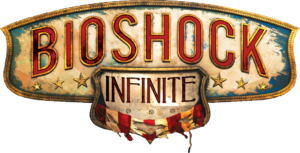
BioShock Infinite absolutely thrilled me with its story. Of course, it’s also visually very appealing and firmly state-of-the-art. The combination of story, atmosphere, and cleverly used AI makes the game a genuine experience. You play Booker DeWitt, a private investigator tasked with rescuing the young woman Elizabeth from a city in the sky. This city was introduced at the 1893 World’s Fair in Chicago and relies on a kind of quantum technology that keeps buildings suspended at altitude via balloons and massive airships. Columbia—the name of the city—is the stage for the entire story, and in appearance, mood, and social structures it’s set at the beginning of the 20th century. I found the whole presentation captivating. The atmosphere, the music, the people you encounter as a player—all have a powerful impact. The isolated city grapples with all the issues of its time: racism, the inequalities of industrialization and capitalism, the role of unions, propaganda, and religion. I found the propaganda particularly well executed, and the struggle of revolutionaries against a racist ruling class gains great depth through many small allusions and details.
It’s a first-person shooter—not my primary genre. But here the story more than makes up for that. The second protagonist is Elizabeth, whose fate is closely intertwined with Booker’s and with several antagonists; she’s essentially the game’s soul. Her fate and her own story, which gradually unfolds, are moving and compelling, and together with Booker she forms an oddly mismatched duo. You’re practically pulled through the story, and I finished the game over a single weekend. It left me emotionally stirred—and intellectually, too, because of the narrative. And I wasn’t alone. The story, especially the ending, is profound, intricate, and philosophically rich; afterwards I went online and discovered countless players felt the need to discuss the ending and the larger narrative and to think it through. You’ll find page after page of speculation, explanations, and reflections. I then played it a second time, carefully following every clue. Only then did all the connections click, and I doff my hat to lead developer Ken Levine. In every respect, the game is a work of art.
All of it is underscored by the brilliant music of Garry Schyman, who chose not a large orchestra but a deliberately small string ensemble. The score is often wistful, constantly tense, and truly brings the characters to life.

In the end I couldn’t resist getting the art book. There’s so much love of detail in every element—whether it’s the city itself and its locations, the uncanny enemies, or especially Elizabeth and Booker. The book shows beautifully how the characters evolved; the concept art documents how the designers gradually found their way to this expressive world. Rumor has it the production costs swallowed 200 million dollars. An impressive sum—but plausible. Art, music, graphics, and story are simply perfect here.
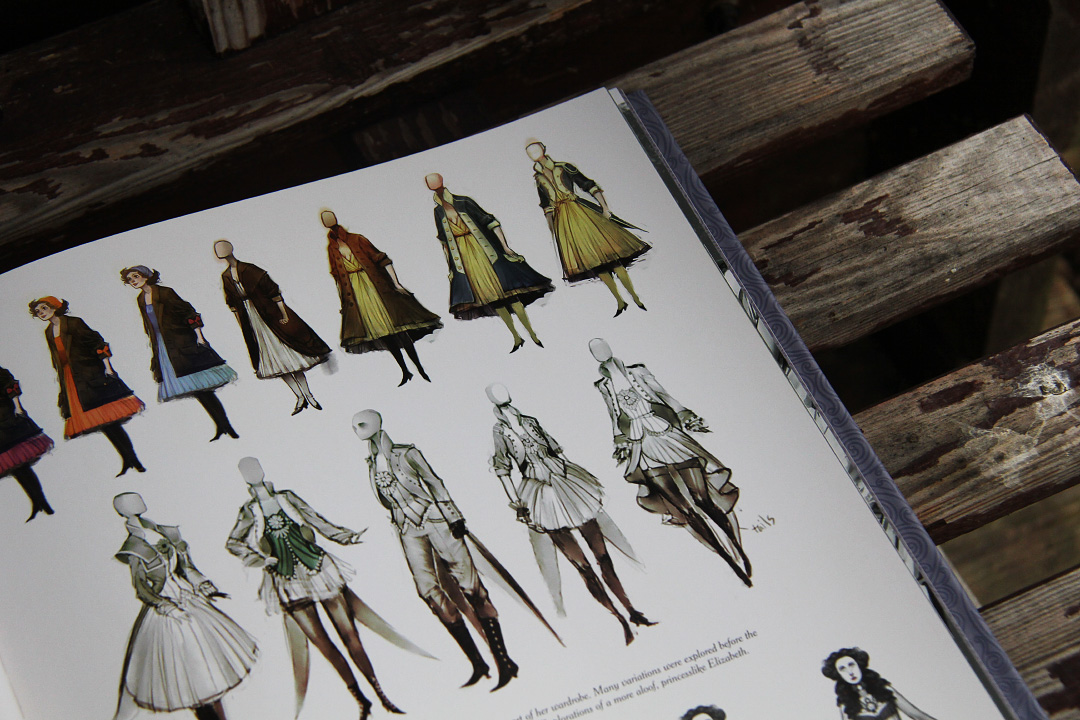
The game can now be had for a good price on Steam, and if you look around you’ll find real bargains. On eBay it goes for under six euros, and with a little patience you’ll catch it for that price directly on Steam too.
You don’t need to have played the first two parts, BioShock and BioShock 2, to enjoy BioShock Infinite. The story is completely independent, and although the first two entries are very good, they don’t come close to Infinite. It’s been three years since I last played it—so it’s probably time again. I imagine it would be stunning in VR.

And here we have another full-on pirate tale. Black Flag is the fourth part of the Assassin’s Creed series, and I must confess I haven’t played any of the others. But since I love the pirate setting, I had to play this one. Set in the 18th century, it takes place in the Caribbean. All the locales you know from pirate stories are here. You control Edward Kenway, a pirate roaming the splendid South Seas, climbing up and leaping down from houses, walls, trees—pretty much anything. You even get your own ship and can board British merchant vessels on the high seas. The gameplay is fast and action-packed, and I was truly terrible at it. I’m just too clumsy for that kind of gameplay. Maybe it was because I played on PC rather than console, but in the end I want to play through smoothly, not seek a challenge.
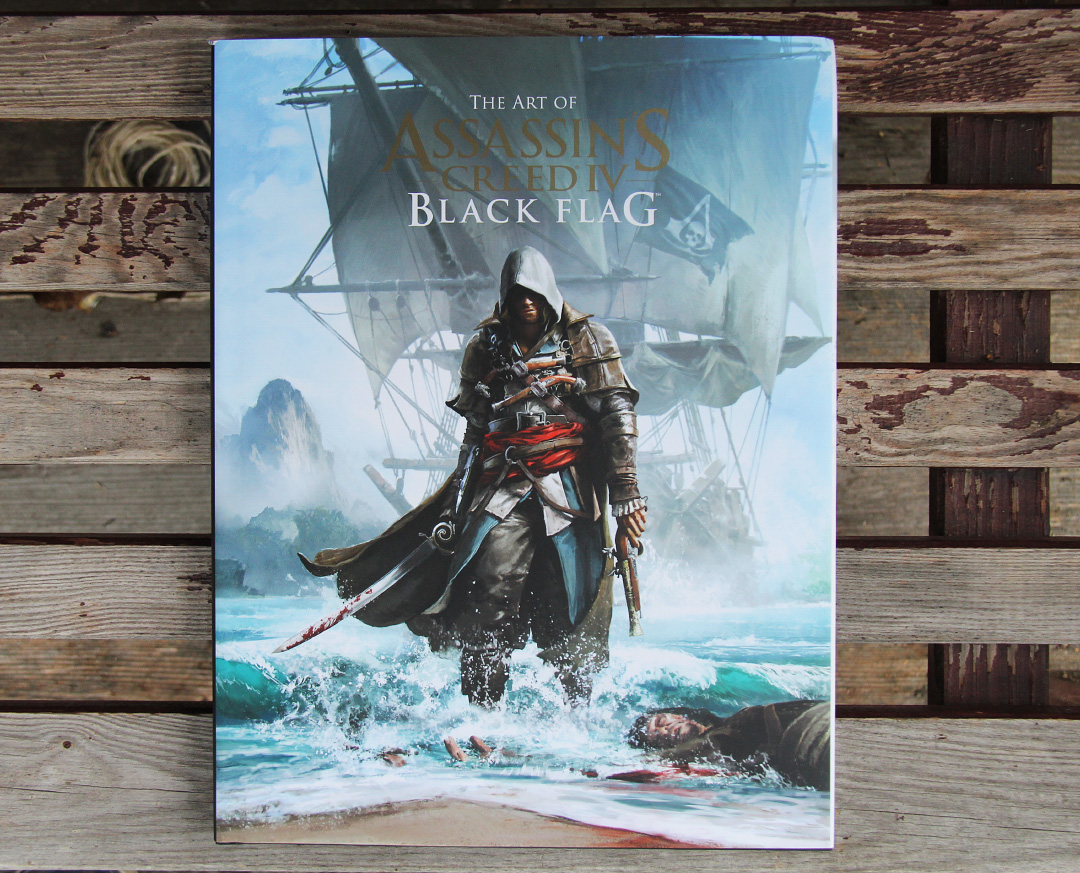
I can’t really remember the story, so it’s not a personal recommendation. What did absolutely delight me, though, was the wonderful graphics—the perfect setting with its love of detail and a special feel for light and lighting moods. When Edward drinks rum on the beach with fellow pirates and watches the sunset, it’s truly impressive. That alone was reason enough for me to buy the art book. The illustrators who created the concept art are, to me, true artists—it’s a joy to leaf through the book. The lovely beaches and islands, pirate hideouts, and big cities like Havana, Kingston, and Nassau are all staged in a very picturesque way.
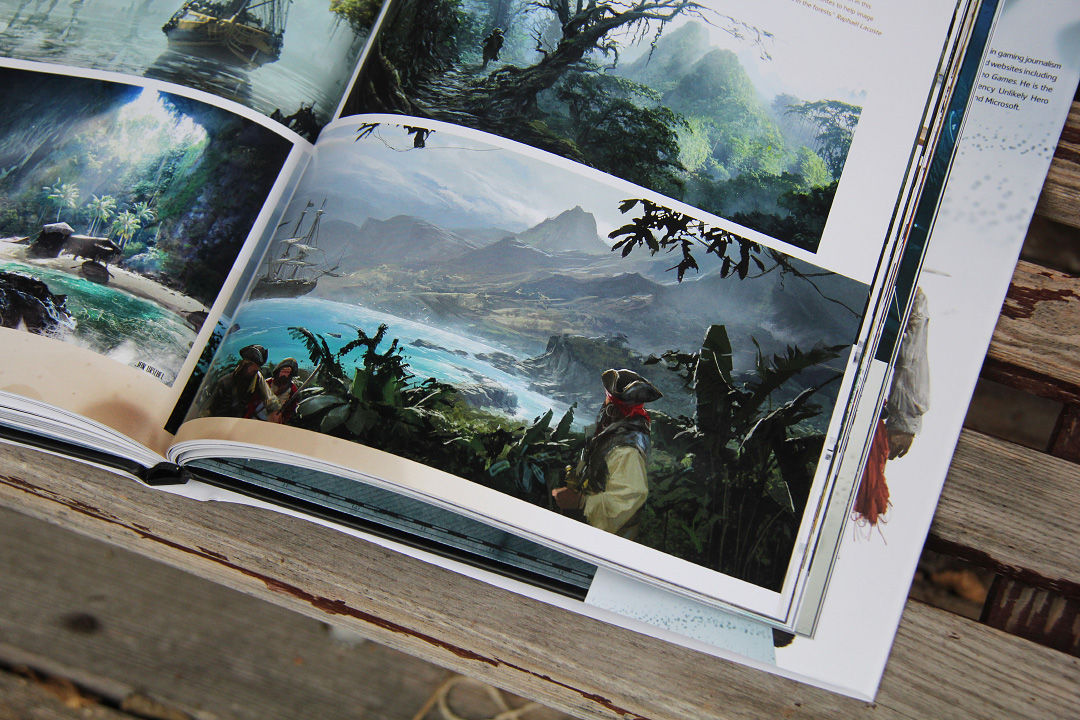
You can find some of the gorgeous images online as well. Whether in the jungle, on islands, or in the cities, I loved my time in this beautiful world. The art book once again shows the huge effort, expertise, and talent behind such a game. Reportedly, 900 people worked on it. According to the production manager, someone was working on the game around the clock—studios are now international and tightly networked.
The music is a clear recommendation, too. Brian Tyler composed truly splendid, large-orchestra pieces brimming with pirate flair. He’s better known for film scores, and here you see that games can easily keep pace with cinema and have now caught up with Hollywood.
This game, too, can now be had for little money on eBay, Amazon, and Steam. Not an expensive pleasure—long playtime and a real wow effect when you first see this beautiful, open world you can roam freely.

I’ve loved fantasy for as long as I can remember, so of course at least one MMORPG had to be on my list. I care a great deal that the world be thoughtful and coherent, with a broad, rich background—not something slapped together carelessly, as in many free-to-play titles. Guild Wars 2 is one of the big fish and kept me hooked for a long time. It offers the classic elements of an MMORPG, but packages them nicely so you don’t slog through monotonous quest checklists; instead, you wander through a dynamic world where events pop up everywhere—you can jump in or keep moving. The world is huge, lovingly crafted, visually appealing, and a joy to explore. You can also play against other players; World vs. World thrilled me. Over Teamspeak, groups of players team up, multiple servers compete, and everyone tries to conquer and hold keeps. It isn’t one single element that sets Guild Wars 2 apart from its many competitors, but the balanced mix of everything on offer.
Here, too, I couldn’t resist and had to have the art book. When the game launched, it wasn’t easy to get—I ordered it from China, which I almost never do. It arrived after two months and was absolutely worth the wait.
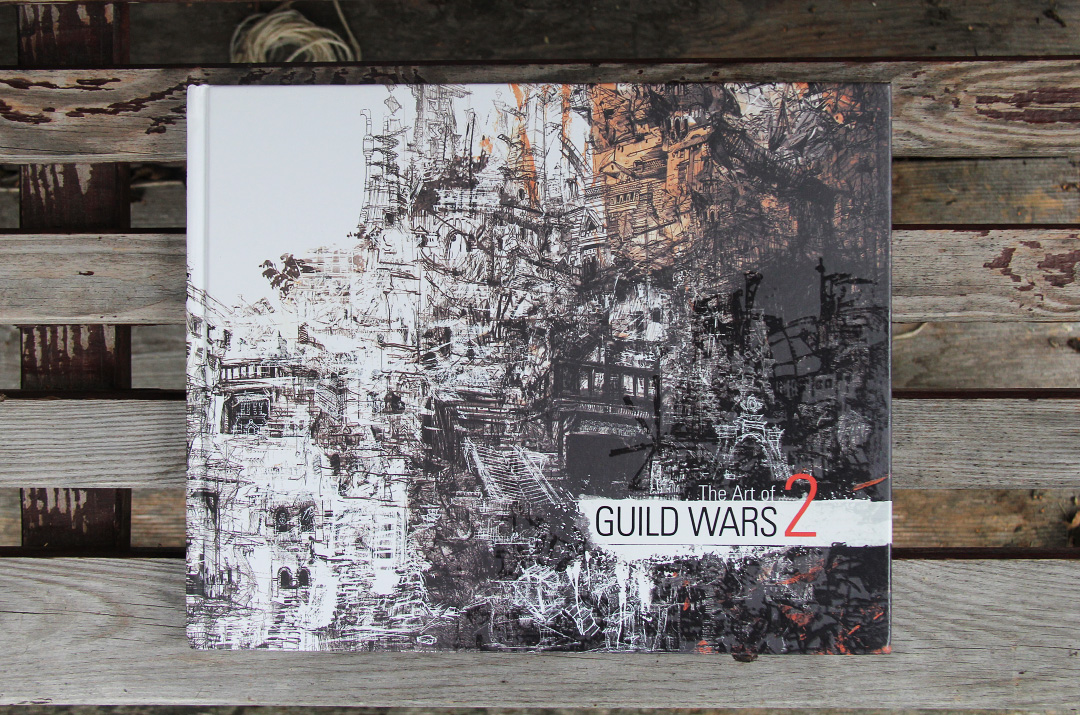
Many very talented artists were involved—for example Kekai Kotaki, who shows much of his work on his website. You can even see in the game’s UI that everything was carefully prepared by illustrators.
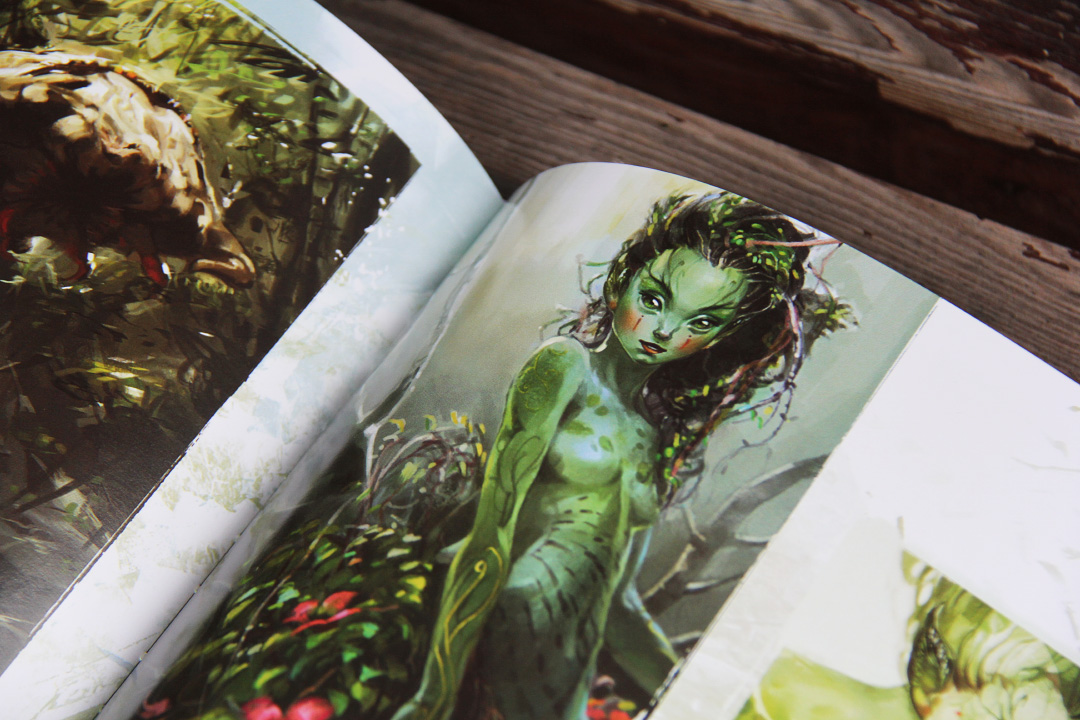
The art has a very distinctive style that strongly shapes the game’s mood.
The superbly composed music by Jeremy Soule also plays a major role—he’s the composer who was honored for his score to Skyrim and whose music makes excellent background listening for reading as well. More on Jeremy Soule below.
Guild Wars 2 is now free to play. The first expansion, however, costs money—though it has often been discounted. Even as a free-to-play title, you don’t need to spend euros to have a fair experience. Spending real money doesn’t grant many advantages, and you can play comfortably without paying extra.

I stumbled upon Firewatch rather by chance—an indie title with a very distinctive style. It has a lovely, highly individual visual aesthetic but shines primarily through its story. The protagonist, whose perspective you inhabit while exploring a national park, is Henry, whose wife suffers from an early-onset form of Alzheimer’s. You learn the backstory through text, and you can already make choices there. In my playthrough Henry was overwhelmed; his wife returned to her parents in Australia, while he fled and took a job as a fire lookout in a Wyoming national park. His task is to watch the park from a fire tower. He’s completely alone and in contact only with another lookout, Delilah, over the radio. A conversation develops between Henry and Delilah, guided by the dialogue choices you select. The setting, the beautiful art, and the story that builds piece by piece create a dense atmosphere that quickly drew me in.
I don’t even know which genre to assign this game to. In a way it’s an adventure—but without puzzles. It has the feel of a survival game—but you’re not fighting to survive. The national park—with its lighting and nature—is lovely to behold, but it isn’t a simulation either. As a player, you can feel the solitude, a certain melancholy, and the slightly dusty vibe of the ’80s. When the fitting, atmospheric song played over the credits, I wasn’t sure whether I’d just watched a film or played a game. In any case, Henry’s story moved me.
Overall it’s a fairly short experience—about five hours—so ideal for anyone with limited time. If you look around, you’ll find it in sales for about ten euros, which the experience is definitely worth.

Baldur’s Gate is another very old title. The first part appeared in 1998 and was overhauled in 2012 for iOS tablets as well. There’s also a second part I loved at the time. The 2D graphics are lovingly drawn, though by today’s standards decidedly dusty. That games of this kind are still popular has been proven by the two Kickstarter projects Pillars of Eternity and Torment: Tides of Numenera, which feature the same 2D look and gameplay and were funded in no time.
Here, too, you can expect a truly extensive story. At points, both entries are quite challenging, and you lead a party of up to six characters through a world set in the AD&D universe—almost as nerdy as pen & paper. I loved the game and also played Icewind Dale, which uses the same principles. You do need time for Baldur’s Gate to really immerse yourself. If you’re after a quick in-between experience, you’ll lose interest here fast. But you’ll be rewarded with classic, richly atmospheric fantasy.

I’ve always thought of The Elder Scrolls series as a graphics juggernaut. Oblivion used to bring every PC to its knees, and Skyrim is a real looker as well. You find yourself in a Nordic fantasy world and have to fight dragons. Story-wise that’s pretty well-trodden, and to be honest I can’t quite remember the plot anymore. What fascinated me was the gorgeous, enormous world that simply feels real. Just exploring it takes a lot of time. You’re rewarded with great lighting moods, beautiful landscapes, and flora and fauna that feel authentic.
The music is definitely another highlight. Like Guild Wars 2, Skyrim was scored by Jeremy Soule. Musically, it feels like a fusion and evolution of classical and film music. You’ll hear many familiar elements, developed further with conviction. I often thought I heard echoes of Richard Wagner, then combined with the gentle strings you know from John Williams or John Barry. And then he adds something distinctly his own—because, unlike films or operas, games are structured differently: scenes repeat and vary in length depending on the player. Ride north on horseback through blizzards, arrive at the sea, and see the northern lights shimmer overhead—and with this music it hits hard. Incidentally, Jeremy Soule is the first composer to fund his First Symphony via Kickstarter; here’s hoping it finally arrives soon.
Even though the game released in 2011, its popularity and its lush world have kept it alive. There have been countless mods (content and graphics), and this year it was remastered as a Special Edition for modern hardware.
A wonderful game—especially for winter evenings—that you can set aside for longer periods and return to. Or you can simply wander aimlessly for hours and explore. There’s so much here for eyes and ears. If you opt for the older Legendary Edition, you can get a Steam key on eBay for about 13 euros—an absolute bargain for so many hours of play.
Conclusion
The takeaway is that there are great games for little money that will, in all likelihood, greatly appeal to book lovers. Then again, I could be wrong—I’m extrapolating from myself to others. Most of the games are in the fantasy genre; you have to like that. Firewatch, by contrast, could appeal to anyone who enjoys contemporary literature. Monkey Island and Black Flag are for those who love adventure novels and a pirate setting. BioShock Infinite is hard to pigeonhole, but as a shooter it’s probably not for the faint of heart. What all these games share is this: they transport you to their own worlds—funny, frightening, realistic, or vast. In any case, they’re rich in atmosphere and leave you with a wealth of new impressions.
How about you? Do you see a title here you’ve loved as well? Is gaming out of the question? Is there a great game that absolutely belongs on this list? Do you find touchpoints between reading and gaming?

Ein toller Post. So einen wollte ich auch immer mal machen, aber du hast das meiste eigentlich schon gesagt :) Skyrim (zocke ich aktuell) und Firewatch finde ich auch richtig klasse, super tolles Feeling! Und Bioshock ebenfalls!
Was eventuell auch etwas für Vielleser sein könnte, sind Games wie Life is Strange, The Walking Dead, Black Mirror, Heavy Rain und mir würden noch einige mehr einfallen :)
Ich finde es gibt eindeutig Berührungspunkte zwischen dem Lesen und dem Zocken – wenn alles stimmt, kann man sich bei beiden Dingen fallen lassen und süchtig werden!
Viele liebe Grüße,
Marie
Liebe Marie,
Life is Strange ist bisher an mir vorbei gezogen. Das sieht ja echt interessant aus. The Walking Dead geht sicher auch in die Richtung. Aber irgendwie konnte mich das dann doch irgendwie nicht begeistern.
Sehr schön zu sehen, dass auch andere Vielleser Games lieben und schätzen und auch Parallelen wahrnehmen.
Liebe Grüße
Tobi
Toller Beitrag! Als Medienpädagogin musste ich in den vergangenen Jahren (auch dank Spitzer) immer wieder gegen Vorurteile gegenüber Games/Gamern ankämpfen und aufklären. Inzwischen hat sich die Sicht auf Spiele glücklicherweise geändert.
Mein Freund würde deinen Beitrag garantiert um “Final Fantasy” ergänzen, nicht zuletzt wegen der/den Stories und der Musik, aber auch wegen der Optik.
Ich selbst finde “Limbo” ganz großartig, weil es in seiner Schlichtheit wirklich genial ist und – wie Stephen Kings Romane – mit den menschlichen Urängsten (und Phobien) spielt.
Erwähnenswert ist sicherlich auch “This War of Mine”, das den klassischen Kriegsspielen einen ganz neuen Dreh verpasst hat, indem es die Empathie des Spielers stark fordert und statt der üblichen strategischen Aspekte einen Fokus auf das Zwischenmenschliche und das Psychische sowie Moralische legt.
Liebe Kathrin,
das kann ich mir gut vorstellen, dass du in dem Umfeld mit vielen Vorurteilen zu kämpfen hast. Das Problem ist halt, dass dann wieder irgendwelche Killerspieldebatten durch die News geistern und dann wird doch oft über einen Kamm geschert. Aber Spiele haben schon ihren festen Platz und wenn ich sehe, wie eindrucksvoll VR ist und wie aufwendig aktuelle Titel sind, dann wird das echt noch spannend, was da so kommt.
“Final Fantasy” konnte mich nie so richtig begeistern, was irgendwie an diese rundenbasierten, taktischen Kämpfen lag. Das muss man mögen. Aber bekannt und sehr beliebt ist die Reihe, das stimmt.
“Limbo” habe ich schon ein paar mal gesehen, aber auf mich hat das irgendwie den Eindruck eines Low-Budget-Casual-Spiel gemacht. Das ist wohl doch einen zweiten Blick wert.
Das Kriegssetting fand ich schon immer echt übel und darauf hatte ich in Spielen nie Lust. “This War of Mine” als Survival Game aus Sicht von Zivilisten hört sich ja mal nach etwas anderem an. Ich hatte mal ein Humble Bundle mit ein paar Kriegsspielen gekauft und das ist echt nichts für mich.
As deinem Kommentar würde ich nun aber herauslesen, dass du eher die berufliche Brille auf hast und selbst weniger zockst?
Liebe Grüße
Tobi
Schöne Liste, schöner Text. Prinzipiell finde auch ich, dass Games mittlerweile gut mithalten können. Für mich ist ein gutes Spiel eine Art Film zum Selberspielen, bei dem man Gameplay-Lücken mit der eigenen Fantasie (wie in einem Buch) füllt. Bei Deinem Beitragstitel hätte ich natürlich an ganz andere Spiele gedacht. Für “Vielleser” ist für mich nach wie vor “Planescape: Torment”. Da musste man wirklich viel lesen :-) Und für Büchernarren interessant sind sicher Spiele wie “Dear Esther”, “The Novelist” oder “Gone Home”. Vielleicht könnte man unterscheiden in: Storydriven Spiele (Bioshock), Spiele zum Lesen (Planescape), Spiele mit schwacher Story aber eigenzubefüllender Gedankenwel (Skyrim).
Meine eigenen Gedanken zum Thema: https://einbuchwiekingsturm.wordpress.com/2016/08/17/schreiben-lernen-ueber-andere-medien-computerspiele/
Liebe Grüße!
Lieber Simon,
das ist natürlich auch nochmal ein Weg zu kategorisieren. Spiele wie “Baldurs Gate” oder “Planescape Torment” mit viel Text sind natürlich auch nochmal was eigenes. Mir ging es aber um eine etwas andere Abstraktion. Was ich in Büchern suche, dass muss über ein anderes Medium, wie es Computergames sind, nicht auf identische Weise vermittelt werden. BioShock beispielsweise hat eine sehr dichte Atmosphäre und eine sehr verwickelte und umfassende Story und beides wird während des Spielens, während man durch diese Stadt gezogen wird, auf eine ganz eigene Art vermittelt. Ich denke da an die Szene wo der Songbird nach Elizabeth sucht und durch das Fenster schaut. Eine Szene aus der Egoperspektive aber gesteuert wie ein Film. Das was in so einem Moment in meiner Vorstellung passiert, das kommt den Bildern und Szenen die Bücher hervorrufen schon sehr nahe.
Deine genannten Titel sagen mir nichts. Hm, dein Vorschlag der Kategorisierung und die genannten Spiele sind vielleicht eine Idee für einen Blogeintrag? Ich glaube der Zusammenhang zwischen Spiele und dem Lesen und Schreiben ist ziemlich interessant, nachdem sich alles irgendwie beeinflusst.
Liebe Grüße
Tobi
Ja, verstehe ich. Bei Bioshock und ähnlichen Spielen sind wir uns eh einig: Wenn die Story derart mitreißt, ist das hohe “erzählerische” Kunst in einem anderen Medium. Skyrim hat dagegen, wie Du selbst schreibst, eine langweilige Story, dafür eine faszinierende Welt, die wir beim Zocken mit eigenem Kopfkino füllen können. “Dear Esther” war einer der ersten Walking-Simulatoren, “Gone Home” ist eine Art Detektivstory im Firstperson-Modus. Gefiel mir beides sehr gut, weil eben Atmosphäre und Story im Vordergrund stehen und sehr viel eigene Phantasie gefragt ist. “The Novelist” mochte ich vor allem, weil der Protagonist eben ein Autor ist :-)
Hey!
Ich habe damals Baldurs Gate gespielt und es sehr geliebt. Daneben habe ich sehr gerne “Die Siedler” gespielt. Ich glaube, dass wir da mehrere Versionen hatten. Außerdem Rollercoaster Tycoon. Da musste man, wenn ich mich richtig erinnere, einen Freizeitpark aufbauen. Ist aber alles schon so viele Jahre her, dass ich das alles nicht mehr so ganz in Erinnerung habe.
LG
Yvonne
Welches Spiel mich total fasziniert hat war The Stanley Parable. Die Art wie dabei Erzählt wird und wie der Erzähler mit dem Spieler interagiert ist einfach fantastisch. Kann ich eigentlich jedem empfehlen, der sich ein wenig für Spiele und alternative Erzählungen interessiert.
An Bioshock Infinit hab ich mich jetzt auch mal wieder dran gesetzt. Ist nach wie vor einer meiner Lieblingsspiele und kann man immer mal wieder durch spielen. Gibt mittlerweile auch die Vorgeschichte zu den ersten beiden Teilen, also wie Rapture entstanden ist und wie es zu dem wurde, was der Spieler letzt endlich vor findet. Ist ganz nett zu lesen, man sollte jetzt aber nicht allzu viel literarische Finesse erwarten.
Sicherlich ist die Betrachtung deines Beitrages etwas schwieriger, aber dennoch versuche ich ein wenig über die Thematik “Games für Vielleser” zu philosophieren. Dabei möchte ich gar nicht so viel auf die Wahl deiner Spiele, die immer gebunden an Interessen und Vorlieben ist, eingehen, sondern allgemeiner würde ich persönlich eher eine Kategorisierung angelehnt an Genre vornehmen. Die Welt der Games ist bekanntlich ebenso vielfältig wie die unserer gedruckten Wegbegleiter.
Kategorien sollen hierbei nicht in Bezug zu “Action”, “Rollenspiel” oder “Sport” stehen, sondern das Schlüsselmerkmal im Erleben eines Games darstellen. Wobei man festhalten muss, dass eine vollständige Abgrenzung nicht möglich ist, sondern Übergänge und Überlagerungen die Regel sind. Aktuell nehmen vor allem Book-A-Like Umsetzungen (Die Zwerge, The Walking Dead) einen besonderen Stellenwert ein, da Geschichten und deren Art zur Umsetzung (Hörbuch mit eigener Geschichtenvorantreibung) endlich wieder in den Vordergrund rücken. In eben diesem Zusammenhang befinden sich auch die Storytelling Games (Bioshock Infinite, Assasin’s Creed, Skyrim, Final Fantasy), wobei die Titel unterschiedliche Methoden einbringen, um einem die Welt näher zu bringen. Cinematic (Heavy Rain, Life is Strange, Beyond Two Souls) verkörpert für mich die Zusammenfassung aller interaktiven Spiele, die mit den Emotionen des Spielers jonglieren und wobei Entscheidungen auch sichtliche Auswirkungen auf den Verlauf haben. Als abschließende und zugleich vielseitigste Gruppierung kann der Bereich aller Indie-Spiele (Limbo, This War of Mine, Yarny, The Stanley Parable) gesehen werden. Vor allem die Konzentration auf bestimmte Darstellungsmerkmale der aufgezeigten Probleme (Schwarzweiße Welt in This War of Mine) fokussiert den Spieler weitaus stärker sich auch mit der Thematik auseinander zu setzen. (Keine Gewähr auf Vollständigkeit der Kategorien)
Abschließend kann ich dir nur zustimmen, dass eine Auseinandersetzung zur „Findung“ äquivalenter Genre ein sehr interessanter Ansatz sein könnte.
P.S. Final Fantasy hat sicherlich seine Grundzüge und Wurzeln in dem klassischen rundenbasierten Konzept, aber seit 2006 ist dieses bereits nicht mehr vorhanden. Aber das Storytelling, die Charaktere und vor allem die durchkomponierte Musik binden den Spieler emotional an die liebgewonnenen Figuren, die nicht selten unverhofft von einem gerissen werden. (Hinweis: In dieser Bewertung ist der aktuelle Titel FF XV nicht mit enthalten)
Lieber Lars,
die Kategorisierung ist ganz gut durchdacht und hört sich ein bisschen nach einer wissenschaftliche Einordnung an. Die Art des Erlebens als Unterscheidungsmerkmal ist auf jeden Fall sehr interessant. Ein Gamer würde sich da wahrscheinlich nur am Kopf kratzen ;) Interessant finde ich die Frage nach den Emotionen die in unterschiedlicher Weise beim Spieler geweckt werden und einen wichtigen Teil des Spielerlebnisses ausmachen. Wenn ich an “The Walking Dead” denke, das ist schon sehr stark darauf ausgelegt und ein zentrales Erlebnis dieses Spiels.
Die Frage ist, wo gehören Survival Games hin? Auf der einen Seite kommen sie oft komplett ohne Story aus (z.B. The long dark), haben aber eine ganz starke emotionale Wirkung. Wenn ich an diese einsame Wildnis in Kanada denke, in der man bei dem oben genannten Spiel landet, die Einsamkeit, das Pfeifen des Windes, das saugt einen schon in das Spiel, auch wenn es grafisch nun kein AAA Spiel ist. Sicher ist die Kategorie Indie-Spiele was, aber wahrscheinlich könnte man noch irgendwie weiter unterteilen.
Bei Kategorien muss ich immer an das Buch Analogien von Douglas Hofstadter denken. Irgendwie hat man einen Hang dazu welche zu bilden, aber irgendwie fühlt es sich auch immer falsch an.
Ich danke dir auf jeden Fall für den interessanten Beitrag!
Herzliche Grüße
Tobi
Du hast Recht, beim Lesen und spielen gibt es einige Berührungspunkte. Gerade wenn man auf die Story eingeht ist ein gut gemachtes Spiel gar nicht so anders als ein Buch.
Bei Baldur’s Gate kann ich mich nur anschließen. Wirkt zwar (gerade aus heutiger Sicht) ziemlich simpel, aber ich finde es ist ein super gutes Spiel und das erinnert mich daran, dass ich den zweiten Teil angefangen, aber noch nicht zu Ende gespielt habe. Skyrim habe ich auch mal kurz angespielt und mochte es, aber irgendwas anderes ist mir dazwischen gekommen. Bei beiden wird es definitiv Zeit, dass ich sie mal weiterspiele :)
Assassin’s Creed IV und Bioshock möchte ich definitiv auch noch spielen.
Liebe Grüße!
Liebe Jacqueline,
man merkt immer ganz schnell, ob jemand schon ein paar Spiele gezockt hat oder nicht. Das ändert die Einstellung zu Games schon grundlegend. Auch das ist wie bei einem Buch: Man muss eben erst auf die richtigen Spiele kommen, so dass die eigenen Begeisterung und das eigene Verständnis dafür geweckt wird. Spielen und Geschichten erleben ist sich ja auch sehr ähnlich.
Ich hoffe ich konnte dich ein bisschen motivieren. Gerade BioShock Infinite ist einfach ein klasse Spiel, das in einem überschaubaren Zeitaufwand durchgespielt werden kann. Das ist das Erlebnis schon wert.
Liebe Grüße
Tobi
Das stimmt, oft gibt es ja doch die Einstellung, dass Spiele kindisch und simpel sind, aber dann kennt man die guten eben einfach nicht. Genau wie die “Lesen ist langweilig”-Fraktion, die einfach noch kein gutes Buch gelesen hat :)
Ja, auf jeden Fall. Da werde ich mich bald bestimmt mal ranwagen!
Lieber Tobi,
ich brauche nur “Monkey Island” zu lesen und schon habe ich wieder die Musik aus der Spelunke auf Melee Island im Ohr ;) Ein ganz großes Spiel, das integraler Bestandteil meiner Kindheit ist und vor allem durch eines besticht – eine gute und unterhaltsame Story! Ich könnte Deine Liste um eine ganze Reihe von LucasArts-Spielen ergänzen aber Du hast da einen guten Querschnitt angelegt.
Vielleicht verkläre ich vieles nostalgisch, aber bei so manchen “modernen” Spielen fehlt mir einfach das Herzblut. Die Games-Welt ist im wahrsten Sinne des Wortes zur Industrie geworden. Gut auf der einen Seite, schade auf manch anderen. Dennoch – und das verleidet mir das Spielen bis heute nicht – gibt es die großen Ausnahmen! Ausnahmen, die eine Geschichte erzählen, der man die Liebe zum Detail anmerkt und die trotz aller Realität eines nicht vernachlässigen – die Phantasie des Spielers!
LG
Stefan
Lieber Stefan,
Monkey Island ist echt vielen bekannt, was mich immer wieder überrascht. Die Musik hat da sicher ihren Teil dazu beigetragen, die finde ich auch sehr gelungen. Eigentlich vom Klang echt billig, aber so kennzeichnend und passend für das Game, dass mir die Titelmelodie wie bei dir sofort in Erinnerung ist.
Zu Monkey Islands Zeiten waren Spiele ja noch richtig was für die Nische. Nun ist es ein Massenmarkt und da ist auch echt viel Trash dabei, da gebe ich dir absolut recht. Es gibt schon echt schöne Spiele, aber man muss da echt suchen und schauen. Wenn ich an die 1000 Free2Play Titel denke, dann ist das echt verrückt, dass die ganzen Spiele auch gezockt werden. Aber jedem das Seine ;)
Liebe Grüße
Tobi
Hallo,
Das Lesen überfordert mich nie und drängelt mich nie, setzt mich nie unter Druck. Bücher sind ruhig und langsam, wenn ich das möchte -oder schnell, wenn ich die Spannung rennen lasse. So mag ich auch Computerspiele. Ich kann es nicht ausstehen, wenn ein Spiel mich hetzt, ich schnelle Entscheidungen treffen muss oder mich womöglich verteidigen muss! Ein Buch würde mich nie angreifen…
Point and Klick Adventures haben genau das richtige Tempo für mich. Schön gestaltet und kreativ, kann man in ihnen schwelgen und trotzdem seinen Kopf bemühen. Ich brauche eine Story und diese muss motivierend genug sein, dass ich weiter spielen will -genau wie ein Buch, ich möchte gepackt werden und nicht mich selbst überreden müssen, weiter zu lesen.
z.B
Der letzte Windmönch
The Room